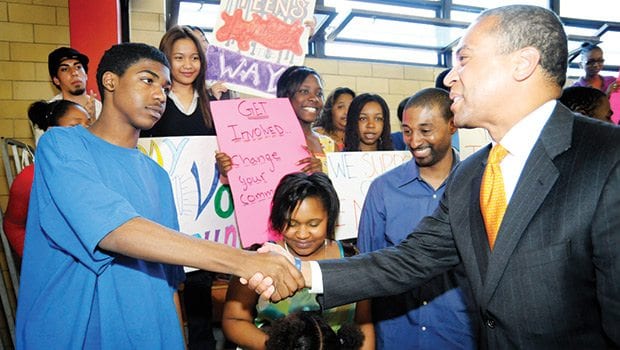Deval Patrick’s ‘together we can’ mantra led to substantial legislative record


Governor Deval Patrick participates in the Boston Menorah Lighting with Governor-elect Charlie Baker and philanthropist Ted Cutler. This event marks the second day of Hanukkah. The lighting was hosted by Rabbi Mayer Zarchi of the Chabad of Boston.
Gov. Deval Patrick secured his place in Massachusetts history with a resounding victory over Republican candidate Kerry Healey in the 2006 gubernatorial campaign, running on the theme, “together we can.”
Over the next eight years, the state’s first black governor put his rhetoric of collaboration to the test, enlisting legislators, local officials and citizen activists in a series of ambitious initiatives that included everything from consolidating the polyglot of state agencies to comprehensive reform of the state’s criminal justice system.
When supporters filed into the State House Sunday for the unveiling of Patrick’s official portrait, present were many of those who helped Patrick push for legislative changes – public higher education advocates, immigrant activists, clean energy entrepreneurs, Democratic Party insiders, legislators, local officials and the ordinary citizens many of whom had their first taste of Massachusetts politics working on Patrick’s 2006 campaign.
When activists with the Black Lives Matter movement interrupted his speech Sunday evening, Patrick welcomed their contribution to the public discourse, even as the hundreds of supporters surrounding the Grand Staircase drowned the protesters out with applause.
“The point the folks were making – about the relationship between law enforcement and black boys in particular – that’s our problem,” he said. “It’s all of our problem.”
Patrick’s embrace of the hecklers underscores the depth of what many see is his inclusive approach to governing. It’s an approach Patrick says has upended business as usual on Beacon Hill.
“The dynamic here is not Democrat versus Republican. It’s insider, outsider,” Patrick told the Banner in an interview last week. “And for the last eight years, the insiders had to share access to the Governor with outsiders, and that’s been intentional. And I actually think it’s been better.”
The outsiders Patrick welcomed into his administration came from all backgrounds — corporate lawyer Mo Cowan who served as Patrick’s chief of staff before being tapped to serve in the U.S. Senate seat left vacant after former Sen. Edward Kennedy’s death; Judy Ann Bigby, who left a job as a medical director at Brigham and Women’s hospital to serve as secretary of Health and Human Services; Angelo McClain, who managed a New Jersey behavioral health program before being appointed commissioner of the Department of Children and Families.
Patrick challenged the status quo with the appointments he made from inside government — placing people of color in positions of power, like Carole Cornelison, whom he appointed head of the Division of Capital Asset Management, Celia Blue, Commissioner at the Registry of Motor Vehicles or Charlotte Golar Richie, director of Government Relations.
While the face of state government changed significantly during his tenure, Patrick pushed an ambitious agenda of government reform with legislative initiatives that touched on disparate areas of government.
Working with the Legislature, his administration consolidated transportation agencies, bringing the Registry of Motor Vehicles, the MBTA, the Massachusetts Highway Department and the Aeronautics Division under one agency.
The Patrick administration also worked to cut business tax rates, while closing business tax loopholes, and helped push through an increase in the state sales tax from 5 percent to 6.25 percent, bringing in additional revenues as the state struggled through economic recovery.
Other initiatives included tax breaks and incentives for the biotechnology and clean technology sectors, both of which expanded in Massachusetts during the eight years of the Patrick administration. Patrick also pushed for the legalization of casino gambling in Massachusetts, a controversial move that angered many in his progressive base, greenlighting licenses for three casinos in the state.
He credits his legislative successes on his collaboration with lawmakers.
“I think the record of accomplishment with the Legislature is very deep, the Legislature having had two of the most productive sessions in decades,” Patrick said. “A lot of what they did were hard things that that had been talked about for a long time, like taking six transportation agencies and consolidating them and shutting down the turnpike authority, or pension reform, which we did two rounds of, ethics reform, CORI reform, health care reform at the municipal level, some of those things had been talked about for a long, long time. I’m proud of the fact that we got them done.”
State Sen. Linda Dorcena Forry, who was chairwoman of the Joint Committee on Community Development and Small Business while serving in the House, credits Patrick with helping pass legislation requiring the state to weigh the effects of proposed business regulations on small businesses before the regulation is enacted or changed.
The administration also reviewed 1,791 executive branch business regulations for their efficiency and effectiveness, and amended or eliminated 255 of them.
“There was a tremendous regulatory burden on small businesses in Massachusetts,” Dorcena Forry said.
In the end, many in the Commonwealth will likely remember Patrick’s tenure as governor for the more visible victories — CORI reform, the redevelopment of the Fairmount commuter rail into a rapid transit line, his leadership in upholding same-sex marriage. Sunday, many of the legislators, local elected officials and citizen activists who envisioned and worked for change with Patrick were there to celebrate those accomplishments.
The presence of hundreds of the state’s change agents suggests that many took to heart his 2006 campaign theme — “together we can.” That triumph of collective action, Patrick hopes, will be the lasting legacy of his tenure in the corner office at the State House.
“It’s all been about collaboration,” said Patrick. “Collaboration is, as they say, a force multiplier. The coalitions that were necessary and the collaboration that was necessary was not just between the person who sits in this office and the people who work down the hall, but about how we bring ordinary citizens into the conversation.”







